 Petzlover
PetzloverBull Terrier Miniature is originated from United Kingdom but Molossus is originated from Greece. Bull Terrier Miniature may grow 43 cm / 16 inches shorter than Molossus. Bull Terrier Miniature may weigh 40 kg / 88 pounds lesser than Molossus. Both Bull Terrier Miniature and Molossus has almost same life span. Both Bull Terrier Miniature and Molossus has same litter size. Bull Terrier Miniature requires Low Maintenance. But Molossus requires Moderate Maintenance
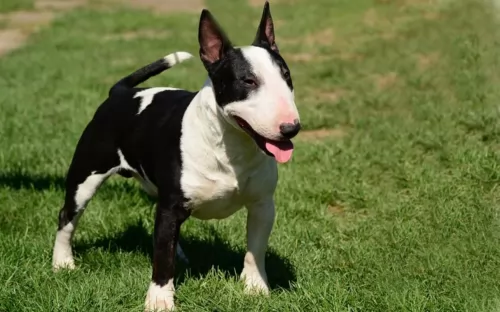 Less well known than the Bull Terrier, the Miniature Bull Terrier which actually follows the same breed standard, has a height of 35cm. The Bull Terrier and Miniature are classified as the same breed. The weight of the smaller Miniature is only about 15kg.
Less well known than the Bull Terrier, the Miniature Bull Terrier which actually follows the same breed standard, has a height of 35cm. The Bull Terrier and Miniature are classified as the same breed. The weight of the smaller Miniature is only about 15kg.
It was in the early 1800s that the Miniature Bull Terrier was developed, descending from the English Bulldog as well as the White English Terrier which is now extinct. This blend produced the Bull and Terrier, which was later shortened to the Bull Terrier. They came in a number of colors such as pure white, white and tan as well as white-and-black-patched or tri-colored.
Breed fanciers wanted a compact dog which looked much the same as the larger Bull Terrier. It was in 1938 that Colonel Glyn founded the Miniature Bull Terrier Club in England and the Miniature Bull Terrier Club of America was formed in 1966.
The Molossus has always been a popular dog and they have been around since ancient times. Mastiff type dogs are termed as Molossus.
Of course, when looking at the origin of the dog, there are many unsubstantiated claims about it. It has always been believed that the Molossus was a Mastiff-type dog, ferocious in battle. The Romans were dog breeders and recognized that the Molossus was a talented dog – good at guarding and herding.
Over the centuries the dog has changed but it is believed it was a Mastiff-type dog with a number of other breeds included in its origins such as the Rottweiler, Pug, Bulldog, Great Dane, Alano Espanol and Saint Bernard.
The Molossus isn’t a dog breed itself but rather a category that other dogs belong to. Today there are Molosser clubs and Molosser shows around the world.
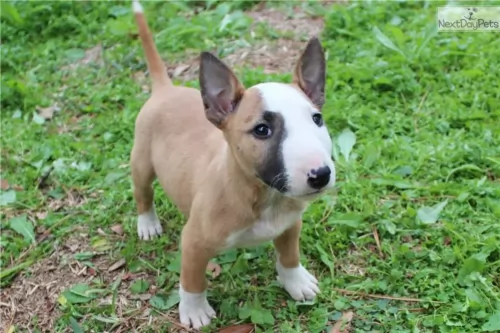 Miniature Bull Terriers, just like the regular Bull Terriers have short, glossy coats and these coats can be white, tan, brindle or tri-color such as black, tan and white. This is a muscular little dog, with the same very distinctive egg-shaped head and small, closely-set dark eyes and erect ears. The medium length tail is carried horizontally.
Miniature Bull Terriers, just like the regular Bull Terriers have short, glossy coats and these coats can be white, tan, brindle or tri-color such as black, tan and white. This is a muscular little dog, with the same very distinctive egg-shaped head and small, closely-set dark eyes and erect ears. The medium length tail is carried horizontally.
The Miniature Bull Terrier isn’t particularly good with small children, but he still makes a good companion for people, whether he lives in the city or the country. In fact, this smaller breed Bull Terrier makes a great pet for people with smaller spaces, and like the Bull Terrier, he is a loving, devoted pet. He has an entertaining personality, is playful and energetic, making him a good watch dog.
However, even though he is small, he is always more than ready to take on any larger pets and therefore isn’t considered the greatest pet to have if you have other animals in the house. However, with excellent training and socialization, this handicap can be overcome.
This Ancient dog breed from Greece has different descriptions of what it really looked like. It seems to have always been large to medium sized dog standing in the region of 50 to 76cm in height and weighing anything from 25 to 55kg.
The coat is mostly short and smooth and can be in a host of different colors. They are large boned dogs, solidly built with medium sized floppy ears, a short, thick neck, short, broad muzzle and a long tail which was later docked.
Molossers typically have heavy bones, pendant ears, and a relatively short and well-muscled neck, with a short, broad muzzle. These Molossers have always been used for a variety of jobs where strength, perseverance, speed and braveness are required. They have been used as rescue- and guard dogs, protecting livestock from predators.
The Molossus dogs all have the same kind of characteristics which have been bred into them. From their working days, they are known for their tremendous courage, taking on wild animals to protect their livestock.
They are territorial, wanting to protect their human family and home from intruders.They have also been bred to be loyal, loving family pets, and being highly affectionate, they want to be involved in the activities of the family.
This breed is gentle and loving, social and active and gets on well with other pets in the home as well as with children. They’re intelligent dogs and will need to be trained and socialized to ensure they are obedient and amicable with visitors to the home.
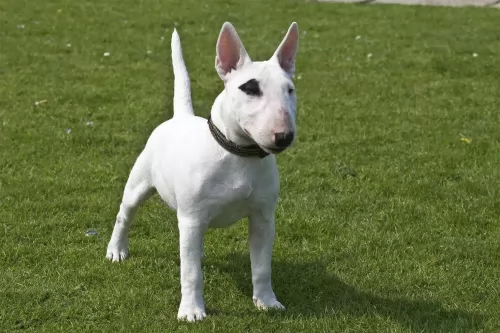 The attractive Miniature Bull Terrier is just a small version of the regular Bull Terrier, and many people are drawn to them because they have all the spunk of the larger breed but are easier to manage. He is such an entertaining little dog and guarantees to make an excellent family companion. He is just longing to be involved in every family activity happening around him.
The attractive Miniature Bull Terrier is just a small version of the regular Bull Terrier, and many people are drawn to them because they have all the spunk of the larger breed but are easier to manage. He is such an entertaining little dog and guarantees to make an excellent family companion. He is just longing to be involved in every family activity happening around him.
He becomes attached to his human family, but this deep bond between him and his family can lead to separation anxiety. Never leave him alone day after day in the backyard. You wouldn’t to that to one of your children, and he is a family member, albeit a 4-legged one.
Just like the standard Bull Terrier, the Miniature Bull Terrier is going to need firm training from a young age. Then he becomes an exceptional pet as he understand the boundaries in your particular home.
The Molossus, contrary to what many people think, isn’t a vicious dog, but rather a good natured dog that makes a wonderful family pet.
These dogs are known also for being hard working dogs with characteristics of bravery. They are dogs who may look fairly tough, but they are actually gentle, calm and sensitive. It’s a bad upbringing from the owners that gives any dog bad characteristics.
Train your Molossus, have him socialized and be a responsible and loving dog owner, and these dogs promise to make you a splendid family pet.
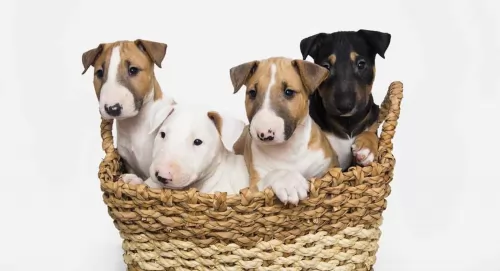 The Miniature Bull Terrier can live to be 10 to 12 years of age. Their most serious health issue is blindness which is caused by lens dislocation, showing up more or less after 3 years of age. With the white dogs, other breed health concerns can include congenital deafness and compulsive tail chasing.
The Miniature Bull Terrier can live to be 10 to 12 years of age. Their most serious health issue is blindness which is caused by lens dislocation, showing up more or less after 3 years of age. With the white dogs, other breed health concerns can include congenital deafness and compulsive tail chasing.
Some Bull Terriers develop a compulsive neurologic disorder where the dog turns round and round chasing his tail. As soon as you see this, try and distract him with an exciting game, because allowed to develop, it’s a habit that can become difficult to control.
This is a common problem with dogs and you need to watch that tartar build-up on the teeth which can lead to infection of the gums. Brush your pet’s teeth with special dog toothpaste and toothbrush 2 or 3 times a week so that he doesn’t lose any teeth. Bad teeth can affect other organs such as the kidneys and heart.
These large dogs are particularly prone to health issues such as hip dysplasia, a genetic condition. A poor diet as well as environmental factors can contribute towards the disease too as well as rapid weight gain and obesity.
This disease develops because the dog’s hip joints haven’t developed properly. The hips then partially dislocate, and the dog has pain and battles to get around. If your dog shows signs of hip dysplasia, he will need to get to the vet to do a physical exam and come up with a treatment- and management program.
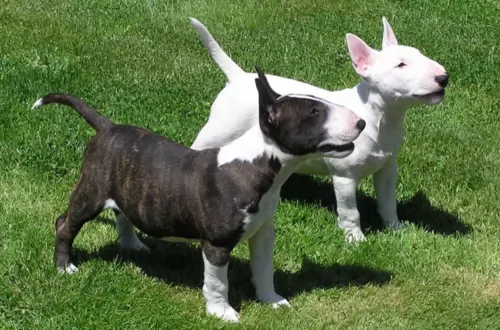 With his short, smooth coat, the Miniature Bull Terriers requires little grooming. He’ll need a good brush down twice a week to remove loose hairs.
With his short, smooth coat, the Miniature Bull Terriers requires little grooming. He’ll need a good brush down twice a week to remove loose hairs.
This is one of the best things you can do for your Bull Terrier if you don’t want them having puppies. Spaying or neutering decreases the likelihood of certain types of cancers too.
Keep your dog’s diet consistent, varying between a top quality commercial produced dog food appropriate to his age. You can include home-made meat, vegetables and rice and some raw meat every now and then. Never feed him human-food such as peanuts, crisps and chocolate. Always have fresh, cool water available night and day.
These dogs were bred to be working dogs and they have always spent their time outdoors performing a guarding or rescue role. Today they require a lot of exercise – walks and ball games – as they are dogs with a lot of energy.
Essentially a large breed, the Molossus will need a commercially manufactured food of high quality if you opt to make use of the convenience of these foods.
Make sure to choose one manufactured for large breeds and which is free of a host of bad ingredients such as corn, soy, wheat, dairy, artificial colors, sweeteners and preservatives.
You want dog food which is high in protein and fat. Try and include some home-cooked food such as boiled chicken, brown rice, pasta and vegetables. An ingredient to look out for in your dog’s food is omega-3 fatty acid to help keep the skin and coat shiny and healthy. Puppies particularly benefit from DHA, or Docosahexaenoic acid, a form of omega-3 fatty acid that is good for brain development.
Brushing the dog’s coat twice a week will be necessary to remove loose hairs, especially during the shedding period. When you brush him, check for ticks and fleas and speak to your vet about flea treatment if necessary. Ears and eyes should be checked and cleaned regularly.